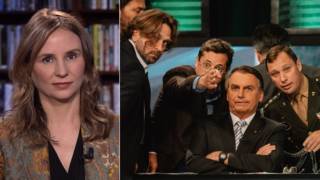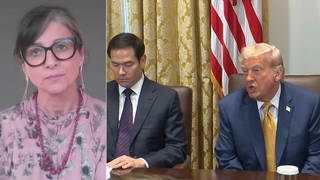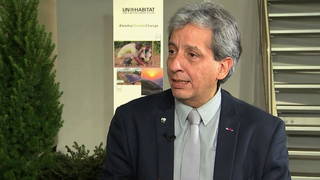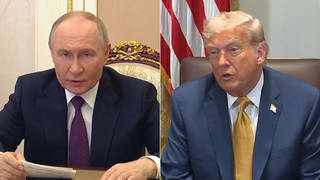
Guests
- Winnie Byanyimaexecutive director of Oxfam International. She served 11 years in the Ugandan Parliament and co-founded the 60-member Global Gender and Climate Alliance.
- Dipti Bhatnagarclimate justice and energy coordinator at Friends of the Earth International.
We wrap up our week-long coverage from Lima at the United Nations Climate Change Conference, where negotiators are hours away from the formal end of the talks. “If developed countries don’t put down the resources that the poor countries need to prepare for climate change to protect themselves from the real impacts they are facing already, then you are going to leave poor people around the world facing hunger, facing increasing poverty without being able to cope,” says Winnie Byanyima, executive director of Oxfam. “Yet they didn’t create the crisis of climate change, and they don’t have the means of solving the problem of climate change on their own. So it is an issue of justice, an issue of human rights.” We also speak with Dipti Bhatnagar, climate justice and energy coordinator at Friends of the Earth International, who helped plan a die-in at COP20 to call attention to those ignored in the global agreement under negotiation.
Transcript
AMY GOODMAN: We are broadcasting from Lima, Peru, at COP 20, the United Nations climate conference, where negotiators are hours away, or maybe days away, from the formal talks, unless they’re extended over the weekend. Activists here from around the world plan to carry out a mass die-in this morning in solidarity with people across the continent and around the world who have been killed while defending the Earth, their communities and their ways of life.
For more on these talks, on this last day of our live coverage here in Peru, and what has to be done, we turn to two guests right now. We turn to Winnie Byanyima. She is executive director of Oxfam. She served 11 years in the Ugandan Parliament and co-founded the 60-member Global Gender and Climate Alliance. Dipti Bhatnagar is with Friends of the Earth International, where she’s climate justice and energy coordinator. She traveled to Lima from Mozambique, where she lives.
We welcome you both to Democracy Now!
WINNIE BYANYIMA: Thank you.
AMY GOODMAN: Talk about the significance of COP 20 here. We’re in the Amazon, the first time an Amazonian country hosts the COP, and yet what is coming out of COP 20? Let’s start with you, Winnie.
WINNIE BYANYIMA: Well, we are worried, because the clock is ticking, and we are coming towards the end of this meeting, but we don’t see the breakthrough yet. It’s very important that this meeting sets the stage for Paris, for us to get a strong deal in Paris next year. A strong deal should include a commitment by the developed countries to put money down to support the poor countries to adapt, to be able to cope with the climate impacts that they are already facing. The question of financing is critical here. The second piece of success for us is that there should be an agreement to have a review of the pledges that will be made in Paris, so that we know whether the commitments meet the science and are fair, that each country is contributing their fair share of keeping the world out of a dangerous climate disaster.
AMY GOODMAN: Dipti, what you want to see?
DIPTI BHATNAGAR: The final text for COP 20 hasn’t come out yet. There’s new text coming out that will still be negotiated, as you said. But, Amy, the big picture at this moment is very clear, that COP 20 Lima is doing nothing to prevent the climate catastrophe. We have impacted people throughout the world, millions that are facing the impacts already of climate change and of dirty energy, which is one of the major causes of climate change. And we have a situation here where we have developed countries undermining their responsibilities, their historical responsibility to act. And as Winnie said, they’re reneging on their finance commitment. They’re reneging on their commitment to support adaptation.
AMY GOODMAN: On Wednesday, Democracy Now!’s Deena Guzder ran into the former U.S. climate negotiator, Jonathan Pershing, and asked him if developed countries owe a climate debt to less-developed ones for causing global warming.
DEENA GUZDER: Do you believe that the U.S. should compensate less-developed nations that are struggling with climate change?
JONATHAN PERSHING: Compensation is probably the wrong way to look at it.
DEENA GUZDER: OK. How should we look at it?
JONATHAN PERSHING: I think it’s probably more effective to look at it in terms of what you can do about the problem, and I’m not sure that compensation will do it. It’s kind of a punitive way to look at it. I wouldn’t have started there. I would have started with: What are your technology options? What are the reduction options? What are the opportunities for least-cost solutions? So, I think the problem with the compensation structure doesn’t help very much.
DEENA GUZDER: And the financial restitution for—
JONATHAN PERSHING: But it implies the same thing, right?
DEENA GUZDER: —our historical legacy of creating the conditions of climate change?
JONATHAN PERSHING: But is that true? Do you think that’s true?
DEENA GUZDER: Yeah, I think the way the developed countries have developed—
JONATHAN PERSHING: Was intentionally meant to do this?
DEENA GUZDER: But it’s not a question of intentionality, right? It’s a question of how we are right now.
JONATHAN PERSHING: And so, intent doesn’t have to matter? Hmm, I don’t know. Probably want to ask other people who are involved in the process. At the moment, the process hasn’t chosen to go down that road.
AMY GOODMAN: That’s Jonathan Pershing, who’s here in Peru. He’s the former U.S. climate negotiator, together with Todd Stern. He was questioned by Democracy Now!'s Deena Guzder. Dipti, if you could talk about this point? Because he's certainly expressing the American point of view.
DIPTI BHATNAGAR: I think it’s pretty preposterous what he’s saying. And there was a similar point made by Secretary of State Kerry yesterday, which is to say, “Yes, we created the climate crisis, 'we' meaning developed countries—the U.S., EU, Australia, etc. But, you know, let’s not worry about whose responsibility it is. Let’s, all of us, do our part.” And, of course, everyone needs to do their part to stop the climate catastrophe, and, as Winnie said, everyone needs to do their fair share, but it’s very, very clear that the U.S. and the EU and all developed countries are not doing their fair share of emissions reductions, finance, etc., to stop the climate catastrophe.
WINNIE BYANYIMA: It’s an issue of justice. If the developed countries don’t put down the resources that the poor countries need to prepare for climate change, to protect themselves from the real impacts that they are facing already, then you’re going to leave poor people around the world facing hunger, facing increasing poverty, without being able to cope. Yet they didn’t create the crisis of climate change, and they don’t have the means of solving the problem of climate change on their own. So it’s an issue of justice. It’s an issue of human rights.
AMY GOODMAN: Winnie, you come from Uganda?
WINNIE BYANYIMA: Yes.
AMY GOODMAN: That’s where you were born. How is Uganda affected?
WINNIE BYANYIMA: Deeply affected. We are seeing farmers unable to predict the weather, to know when to plant, what to plant. They put seeds in the soil. A flood comes, and the seeds rot in the ground. Or a drought comes, and the seeds dry in the ground, and there’s no food for seasons. We’re seeing women unable to provide for their families, because the water is farther and farther away. The source of energy for cooking at home is not available. We’re seeing struggling people hurting even more. So, climate change is having a real impact on the lives of poor people already, whereas the richer people can protect themselves. It’s urgent. I was marching here the day before yesterday. We were 15,000 people in the streets of Lima. I was with indigenous women there from all over Latin America who were saying, “We’re hurting. We’re unable to feed our babies. We want solutions now.” But I see here not enough sense of urgency.
AMY GOODMAN: You just came from the rainforest? You visited northern Peru?
WINNIE BYANYIMA: I did. I did. I visited northern Peru. I found there farmers, farming women and men, who are being pushed off their land by companies that are there to grow biofuels, which is a way of responding to climate change, but which is pushing people off their land. So we’re seeing real impacts, real struggles of poor people. But solutions have to be found here.
AMY GOODMAN: Now, Dipti, you are the climate justice representative of Friends of the Earth. You live in Mozambique. Explain that term, “climate justice.”
DIPTI BHATNAGAR: The idea of climate justice, Amy, is that the current system, the current energy system, the current food production system, is what created the climate crisis. And if we try to solve climate change without taking that into effect, then we don’t serve the people who were any way impacted by the current system. So climate justice says that we really need to think about the developing countries. We need to think about the poorest and most vulnerable people on this planet. What is the impact on them, not just from climate change, but from dirty energy, from the current models of the energy system?
AMY GOODMAN: What was your takeaway from Secretary of State John Kerry’s speech? Many here said that’s the old John Kerry—impassioned, making a statement about climate change. What do you think it said to an American audience and to the global audience?
DIPTI BHATNAGAR: I think it was good that Secretary of State Kerry acknowledged the depth of the planetary crisis. And I think—I know that there is a difficult situation, political situation, that he faces in his own country. But one of the things that the U.S. is very deliberately doing is pushing a voluntary, nonbinding, non-legally binding system of pledges for emissions reductions.
AMY GOODMAN: Let’s go back to a clip of Secretary of State John Kerry speaking here in Lima.
SECRETARY OF STATE JOHN KERRY: Now, of course, industrialized countries have to play a major role in reducing emissions. But that doesn’t mean that other nations are just free to go off and repeat the mistakes of the past and that they somehow have a free pass to go to the levels that we’ve been at, where we understand the danger. I know this is difficult for developing nations. We understand that. But we have to remember that today more than half of global emissions—more than half—are coming from developing nations. So it is imperative that they act, too.
AMY GOODMAN: That’s Secretary of State John Kerry. Let’s turn to Winnie Byanyima, who is the executive director of Oxfam International.
WINNIE BYANYIMA: Yeah, Secretary Kerry’s leadership and personal commitment is very welcome, and American leadership is welcome. But the point he’s making—it’s important to recognize that there is—for every country, there is its ability, ability to contribute to reducing carbon emissions. There is the issue of responsibility, how much it has contributed to this crisis. And there’s a question of development need, its needs. And these three must be put in balance. So, for a poor country that didn’t—that has little responsibility for creating climate change or global warming, for a poor country that has a need to adapt to prepare and protect its people from the impacts that are real, and for a developing—a poor country that needs to overcome poverty, then its contribution has to be measured with those things in mind. For a richer country that has more responsibility, contributed more to climate change, that has the resources and technology to address the problem and has already affluence, then it must put down more resources.
AMY GOODMAN: Last 15 seconds, as we wrap up our climate summit coverage.
DIPTI BHATNAGAR: As I said, Lima, COP 20, is doing nothing to actually stop the climate catastrophe. But people are acting. There’s mass mobilizations. There will be an action here at 11:00 a.m. There will be a die-in, talking about justice, talking about impacted people, energy, food, the real issues that people care about. And we were talking about seeds earlier. So our slogan is: “They buried us, but they didn’t realize that we were seeds.” So we grow, and the movement will continue to grow on the road to Paris and beyond.
AMY GOODMAN: We have to leave it there. I want to thank you so much, Dipti Bhatnagar and Winnie Byanyima, who is the executive director of Oxfam International, Dipti with Friends of the Earth.
That does it for our show. Special thanks to our whole crew here in Lima, our crew in New York and to the folks at AP who helped make this broadcast possible.













Media Options